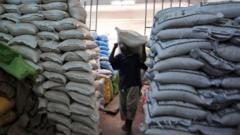The shifting dynamics between Bangladesh and Pakistan, once adversaries, are raising alarm in India.
India Monitors Growing Bangladesh-Pakistan Relations

India Monitors Growing Bangladesh-Pakistan Relations
India is concerned as Bangladesh strengthens ties with Pakistan through trade and military cooperation.
The dramatic political shifts in Bangladesh have led to a notable thaw in relations with Pakistan, as evidenced by the recent import of 50,000 tonnes of rice from Islamabad. After years of acrimonious history stemming from the Bangladesh Liberation War in 1971, direct trading between the two countries has been revived for the first time. Additionally, military contacts and direct flights are being reinstated, with a reported simplification of visa regulations.
The backdrop of this developing relationship is tense and layered with historical grievances. In 1971, Bangladesh—previously known as East Pakistan—fought for independence, a struggle supported by India. These historical ties have been a source of animosity, especially during the 15-year leadership of Sheikh Hasina, who maintained a close alignment with India while distancing Bangladesh from Pakistan. Now, with Hasina ousted and the political landscape altered, Bangladesh appears to be warming up to its former foe.
Experts interpret this shift as not merely a return to neighborly ties but possibly a strategic maneuver against India's regional influence. "Pakistan and Bangladesh may be aligning to counterbalance India's dominance," suggests Ayesha Sidiqq, a Pakistani academic. The renewed interactions include high-level military discussions, including a Bangladeshi delegation's recent visit to Pakistan and participation in joint maritime exercises.
The Indian government is closely observing these developments due to its longstanding adversarial relationship with Pakistan. Relations between India and Bangladesh have also soured following Hasina's exit. Bangladesh's failure to secure Hasina's extradition over an array of charges is a highly sensitive issue between the two countries.
While military ties are being rekindled, they echo past tensions surrounding allegations of insurgent groups operating in Bangladesh with ISI support—a point tied to India’s security concerns. Bangladesh’s interim administration has refuted claims about ISI operations on its soil.
Furthermore, the complex historical backdrop remains an impasse to smoother relations. Bangladesh has long sought an apology from Pakistan for the atrocities committed during the 1971 war, an issue that Pakistan has shown reluctance to address, complicating future discussions.
Economically, there is potential, as bilateral trade is minimal compared to the populations of both nations. Experts assert that fostering trade relations could serve as a foundation for a more amicable partnership, which is underscored by future diplomatic engagements.
With general elections on the horizon for Bangladesh, any shift in governance could further alter the dynamics between the three nations involved. For India, a stable and friendly Bangladesh is pivotal for regional peace and stability, especially to its northeastern states where tensions often run high.
The backdrop of this developing relationship is tense and layered with historical grievances. In 1971, Bangladesh—previously known as East Pakistan—fought for independence, a struggle supported by India. These historical ties have been a source of animosity, especially during the 15-year leadership of Sheikh Hasina, who maintained a close alignment with India while distancing Bangladesh from Pakistan. Now, with Hasina ousted and the political landscape altered, Bangladesh appears to be warming up to its former foe.
Experts interpret this shift as not merely a return to neighborly ties but possibly a strategic maneuver against India's regional influence. "Pakistan and Bangladesh may be aligning to counterbalance India's dominance," suggests Ayesha Sidiqq, a Pakistani academic. The renewed interactions include high-level military discussions, including a Bangladeshi delegation's recent visit to Pakistan and participation in joint maritime exercises.
The Indian government is closely observing these developments due to its longstanding adversarial relationship with Pakistan. Relations between India and Bangladesh have also soured following Hasina's exit. Bangladesh's failure to secure Hasina's extradition over an array of charges is a highly sensitive issue between the two countries.
While military ties are being rekindled, they echo past tensions surrounding allegations of insurgent groups operating in Bangladesh with ISI support—a point tied to India’s security concerns. Bangladesh’s interim administration has refuted claims about ISI operations on its soil.
Furthermore, the complex historical backdrop remains an impasse to smoother relations. Bangladesh has long sought an apology from Pakistan for the atrocities committed during the 1971 war, an issue that Pakistan has shown reluctance to address, complicating future discussions.
Economically, there is potential, as bilateral trade is minimal compared to the populations of both nations. Experts assert that fostering trade relations could serve as a foundation for a more amicable partnership, which is underscored by future diplomatic engagements.
With general elections on the horizon for Bangladesh, any shift in governance could further alter the dynamics between the three nations involved. For India, a stable and friendly Bangladesh is pivotal for regional peace and stability, especially to its northeastern states where tensions often run high.






















